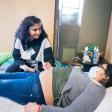Almost all young people know about condoms and birth control pills, but they’re less aware of other options like intrauterine devices (IUDs) and implants. Healthcare providers can be an important source of information, but young people don’t always have access to clinic visits. Many lack insurance coverage, have concerns about cost, distrust medical institutions or have experienced discrimination when they sought care. Even for people who make it to the clinic, providers don’t always educate people on the full range of methods.
We need innovative approaches to provide education on birth control at places where young people gather. New research from Beyond the Pill tested a simple, low-cost method for raising awareness and knowledge about birth control options with community college students.
Students attended an education session led by a research assistant. They reviewed youth-friendly educational charts on their own and had the opportunity to ask questions. The sessions lasted about 10 minutes.
Researchers found that prior to the sessions, students had high levels of awareness of male condoms and pills, but fewer students had heard of IUDs, the implant, the shot, the patch or the vaginal ring. Their awareness and knowledge increased significantly after the short education sessions. Most students found the intervention helpful and were interested in learning about methods that were new to them.
The sessions increased awareness and knowledge regardless of students’ gender identity, sexual history, sexual orientation, race/ethnicity and whether they were born in the US. Men started out with far lower awareness, so their increases after the sessions were especially large.
All young people should have access to the information they need about contraception to have autonomy in their reproductive lives. This simple, easy to replicate intervention improved all students’ awareness and showed they would benefit from ongoing education to find the method best suited to them. This research lends support to efforts to provide birth control education on campuses for all young people.
“The most interesting thing I learned was how there were other ways to prevent pregnancy other than a condom or pill."
- female community college student, age 22

